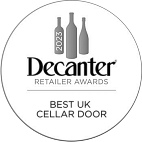Popping the cork – that ceremonial moment when sparkling wines announce their imminent arrival to a glass near you. And just one reason why the cork itself is as carefully chosen as what it’s preserving in the bottle. Here are six more facts about the versatile natural material and why at Gusbourne we’re particular about the corks we use in our wines.
1 Cork is natural
A bit like grapes, cork is a sustainable, renewable crop. Unlike grapes, it’s harvested only every nine years. All the world’s cork comes from quercus suber (cork oak) forests in the western Mediterranean: Portugal, Spain, Morocco, Algeria, Tunisia, Italy and France. Cork’s honeycomb cellular structure of makes it lightweight, flexible, malleable and perfect for all kinds of applications, from eco-friendly floor tiles to old-school pin-boards and, of course, wine closures.
2 Cork taint is real
Despite all its admirable qualities, natural cork has one major drawback: it’s an ideal environment for TCA (tricholoroanisole), the molecule responsible for cork taint. If you’ve never been disappointed by a corked wine, count yourself lucky. That unmistakable smell of damp cardboard (some people are more sensitive to it than others) is said to afflict around five per cent of all wine bottles closed with cork. While a corked wine won’t harm you, it can certainly leave a bad taste in more than one way.
3 Nothing is air-tight
Micro-oxygenation happens in all bottles, no matter what they’re closed with, but the way the wines age will be different. Take, for instance, the same red wine and age it for 20 years under cork and under screwcap. “The wine under cork will become soft and integrated, the fruit flavours becoming more savoury, with mushroomy, earthy notes coming through,” says Dan Grainger, manager at The Nest. “Under screwcap, there’s a little disk inside that allows oxygen to pass through at the same rate as cork, but that wine would still taste of its core fruit and wouldn’t show those more complex, savoury notes.”
4 People prefer cork
Synthetic closures, metal screwcaps, glass, natural cork, agglomerated cork – there are plenty of choices for both winemakers and consumers. But despite the convenience of screwcaps and the absence of cork taint with synthetic and glass closures, people still seem to prefer cork. A 2018 study published in the International Journal of Hospitality Management found that participants rated wines higher for appearance, taste and overall quality when they were led to believe that those wines were closed with a cork. Millions of corkscrew owners can’t be wrong.
5 Corks have evolved
Great things happen when science and nature work together – something we’ve always believed at Gusbourne. It’s why we use Diam corks. Made from specially ‘de-aromatised’ agglomerated natural cork, Diam corks virtually eliminate TCA cork taint. But that’s not the only benefit. “When you taste a wine under traditional cork versus under Diam,” Dan explains, “the Diam shows the wine in a fresher way, preserving the fruit profiles for longer over time. Bottle-ageing trials have also showed that wine ages better, more gracefully, under Diam versus traditional cork. Our wines don’t suffer from a lack of freshness – they have good acidity – but over long-term ageing we want to keep the wine’s vitality, and Diam delivers that.”
6 The perfect pop is in your hands
The Diam Mytik corks we use for all our sparkling wines have a distinctive, bottle-hugging shape – and a pleasing resistance. There’s a knack to the perfect pop that Master Sommelier and Gusbourne Global Brand Ambassador Laura Rhys advocates: “Thumb on top, two fingers on the cork, bottom hand on the bottle neck. Grip the cork hard and very slowly turn the bottle, not the cork. You’ll start to feel the pressure releasing.”
Join us for a tour at The Nest in Appledore, Kent, to learn more about how we make and bottle our wines at Gusbourne.
You may also like...









